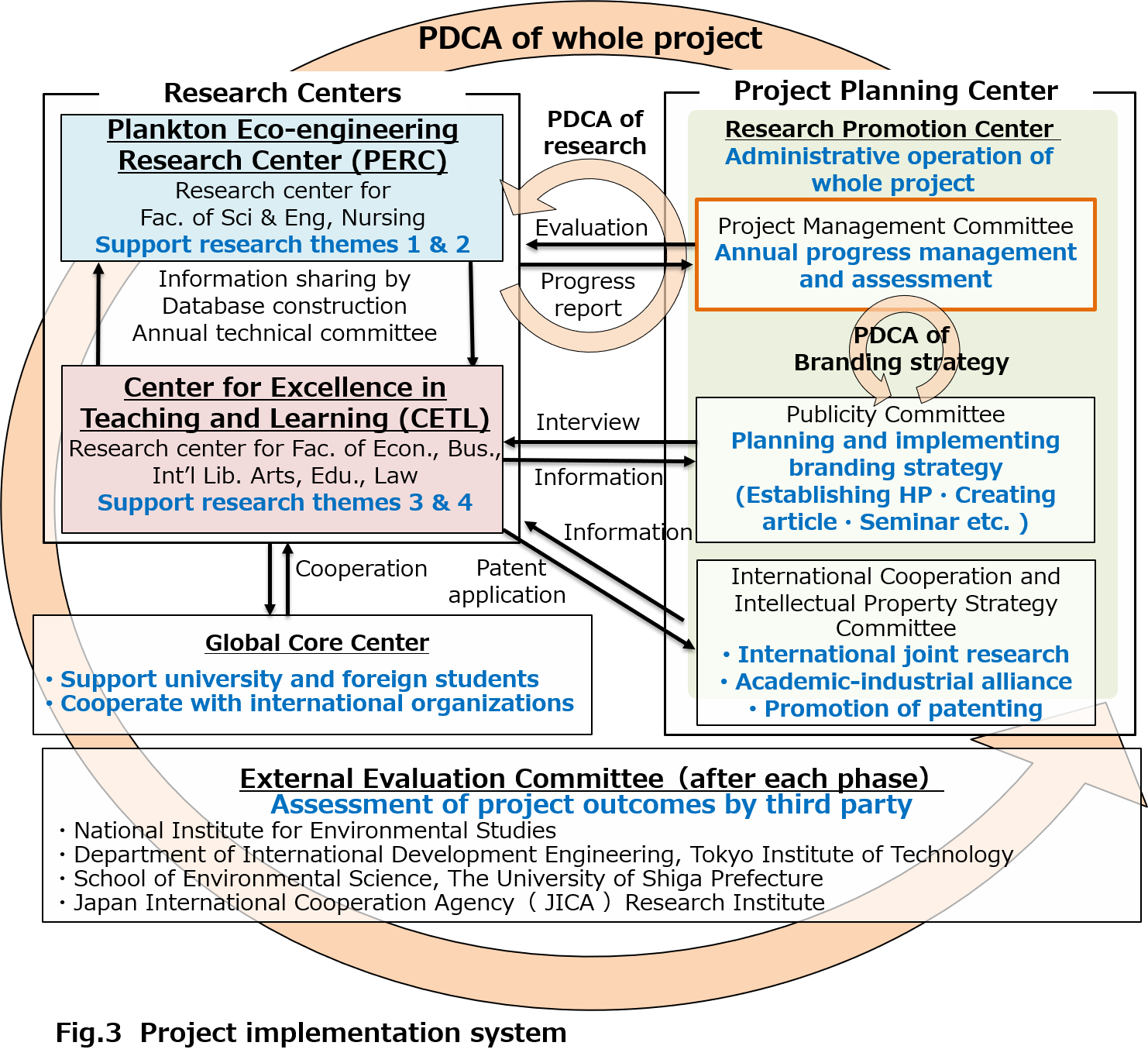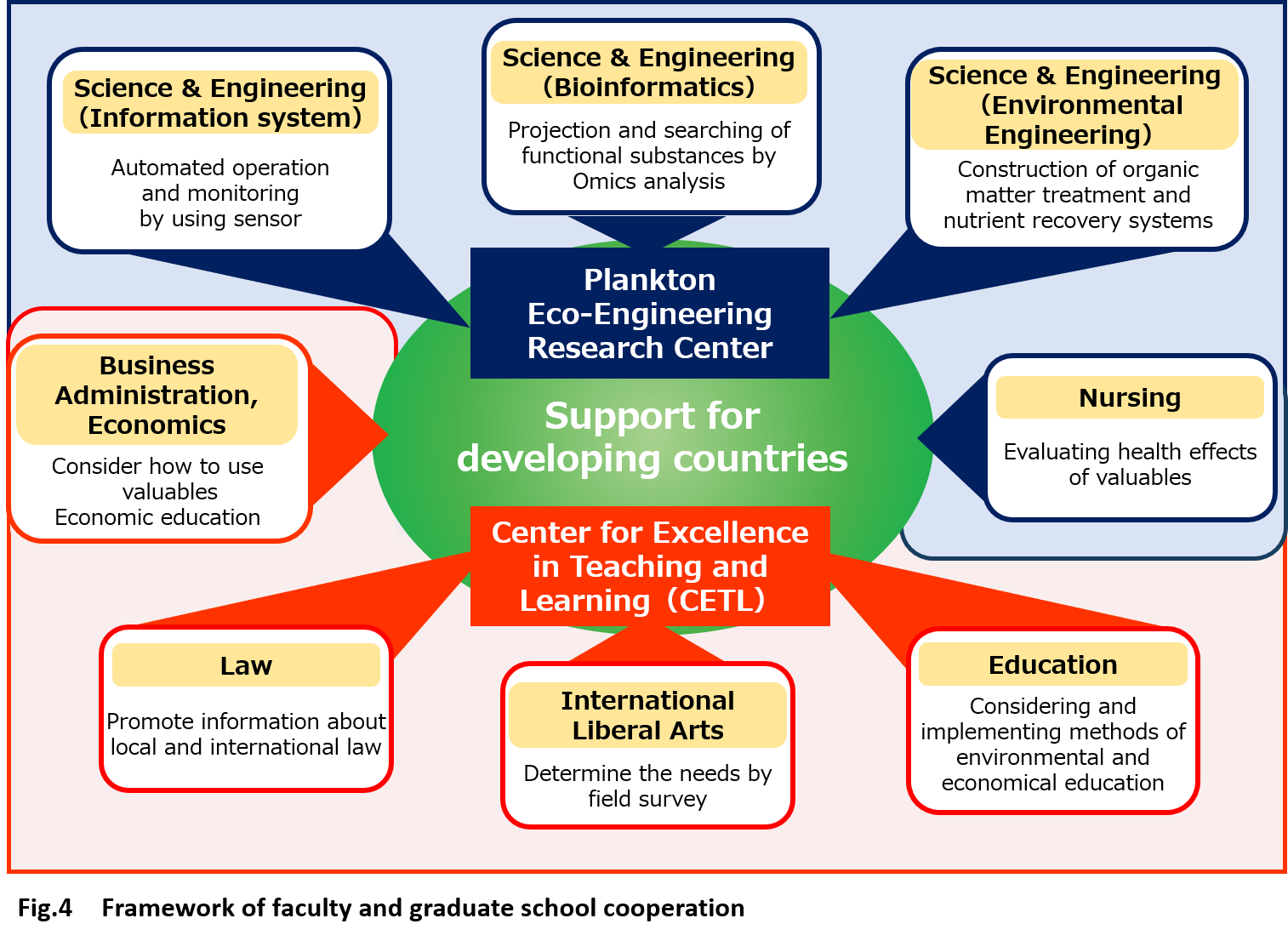- Research
- Private University Research Branding Project
- Project Implementation Systems
Project Implementation Systems
A. University implementation system
Soka University has already established the “Research Promotion Center”, which focuses on research strategy and research support, initiated by the president. The "Research Promotion Center" is an organization directly under the executive board with the Vice President as the Director, and it is the same position as the faculties and graduate schools. The "Research Promotion Center" includes the "Project Management Committee", which conducts the development of the research environment and monitoring, progress management and evaluation of research projects, “International Cooperation and Intellectual Property Strategy Committee”, which conducts management of the joint project, industry-academia collaboration, and intellectual property, and “Publicity Committee” which conducts public relations activities of the university based on research and educational outcomes. In addition, Soka University has newly established the “Plankton Eco-engineering Research Center (PERC)” as an activity base of undergraduate and graduate school of science and technology. As an activity base of the faculty of arts, the “Center for Excellence in Teaching and Learning (CETL)” conducts surveys and public relations activities on improving classes and education. At the “Global Core Center” promoting outside-campus exchange and international collaboration, we support foreign students and send students abroad. As just described, in this project, a system for conducting the project throughout the university is being developed, centered on the “Research Promotion Center” (Fig. 3). The establishment of the university research support system and application for this project has been decided by the Board of Directors and widely disseminated at all faculty meetings, and has been established primarily as a university.

B. Self-inspection/evaluation system and external evaluation system
In this project, PDCA cycle is developed throughout (1) research activities, (2) branding strategy, and (3) whole project.
[PDCA cycle of research activities]
"Project Management Committee" of "Research Promotion Center" plans project master plan (Plan). The research activities are supported by the "Plankton Eco-engineering Research Center (PERC)" in the Faculty of Science and Engineering and "Center for Excellence in Teaching and Learning (CETL)" in the Faculty of Arts, and conducted by departments and graduate schools (Do). Faculties and graduate schools cooperate mainly with these two institutions (Fig. 4). The "Project Management Committee" conducts progress management and evaluation of the research activities once a year (Check), and corrects the implementation plan (Act). In addition, "PERC" and "CETL" jointly establish a "Technical Committee" to grasp the progress status of each research theme, and coordinate mutual coordination between research themes once a year. In this project, since each research theme is deeply related, we believe that the "Technical Committee" plays an extremely important role in attaining project goals. Furthermore, in order to facilitate communication of information between research organizations in science and literature, the data collected and analyzed by this project is managed in the in-campus shared database.

[PDCA cycle of branding strategy]
As with research activities, the "Project Management Committee" of the "Research Promotion Center" devises a branding strategy for each stakeholder in this project (Plan), and actual public relations activities are carried out by the "Publicity Committee" within the center (Do). Progress of the branding strategy is managed and evaluated periodically by the "Project Management Committee" (Check), and each stakeholder modifies the branding strategy (Act).
[PDCA cycle of the entire project]
In this project, Phase 1 (1st – 3rd year) conducts laboratory experiments, field survey and analysis, and improvement of collaboration with external organizations, and Phase 2 (4th to 5th year) conducts bench scale experiment in developing countries, establishes international value chain, proposes BOP business, and holds workshop with United Nations and local NGO, and PDCA cycle is used in each phase. In Phase 1, the " Project Management Committee " of the "Research Promotion Center" formulates project plan (Plan), and activity status carried out by each organization (PERC, CETL, Publicity Committee, International collaboration and Intellectual Property Strategy Committee, and Global Core Center) (Do) is managed and evaluated (Check) by the external evaluation committee (details are described below), and a proposed draft for smooth progress of the whole project is presented (Act). Each organization reflects proposed amendments from external organizations in project activities. When implementing this project summary after Phase 2, we will adopt the PDCA cycle and continue to promote the branding activities of the university even after the project is over. At the end of each phase, we will prepare a report (Phase 1: interim report, Phase 2: final report).
C. External organizational system
In order to comprehensively evaluate the progress of technology development, economic and social contribution to developing countries, and the impact on the international community, we will establish "External Evaluation Committee" consisting of experts from National Institute for Environmental Studies, School of Environmental Science, The University of Shiga Prefecture, Department of International Development Engineering, Tokyo Institute of Technology, and Japan International Cooperation Agency (JICA) Research Institute. The “External Evaluation Committee” meets once a year, and receives an objective evaluation by a third party with a five-point rating (A-E). Comments from third-party evaluations are reflected in activities during each fiscal year and the after project.
D. Collaboration system outside of university
Through participation in “UN Academic Impact” (2014), co-hosting of "Social Business Design Contest" (2014), concluding “Refugee Higher Education Program” (2016), etc., Soka University has been supporting activities of UN and building strong relationships of trust. In this project, the "Global Core Center" who received the decision of the "Research Promotion Center" plays the main role to cooperate with the stakeholders outside the university such as the United Nations, local NGOs, local international students, young researchers, and entrepreneurs, and jointly hosts local workshops, accepts foreign students, and implements various training smoothly.
Ethiopia is assumed as a model case of developing countries that implement this project, but the Soka University and Jimma University have already concluded Memorandum of Understanding (MOU). We have conducted collaborative research for many years for example Jimma University vice president visited to our university and our Science and Engineering Department dispatched researchers to Jimma University. Since 2016, we are carrying out field trials as an international collaborative research project of the Faculty of Science and Technology of our university.
Soka University signed an academic exchange agreement with 55 countries of 185 universities (as of March 2017), and selected to be one of the 37 universities in the “Top Global University Project” (type B, Globalization traction type) of the Ministry of Education, Culture, Sports, Science and Technology in 2014. Soka University actively exchanges academic activities with universities such as Delhi University, India and Ghana University, Ghana, which are located in the Sunbelt region. Therefore, after completing this project, we will expand Ethiopian model case horizontally to those universities and actively work with other universities in the Sunbelt region.